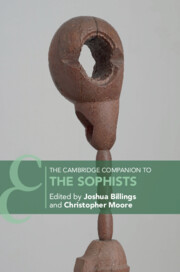Book contents
- The Cambridge Companion to the Sophists
- Other Volumes in the Series of Cambridge Companions
- The Cambridge Companion to the Sophists
- Copyright page
- Contents
- Contributors
- Note on the Text
- Introduction
- Part I Contexts
- Part II Thought
- 5 Nature and Norms
- 6 The Turn to Language
- 7 Problems of Being
- 8 Politics in Theory and Practice
- 9 Interrogating the Gods
- 10 Skills of Argument
- 11 Civic and Anti-Civic Ethics
- Part III Receptions
- Appendix: The People of the Sophistic Period
- Select Bibliography
- Index
- OTHER VOLUMES IN THE SERIES OF CAMBRIDGE COMPANIONS (continued from page ii)
6 - The Turn to Language
from Part II - Thought
Published online by Cambridge University Press: 23 December 2023
- The Cambridge Companion to the Sophists
- Other Volumes in the Series of Cambridge Companions
- The Cambridge Companion to the Sophists
- Copyright page
- Contents
- Contributors
- Note on the Text
- Introduction
- Part I Contexts
- Part II Thought
- 5 Nature and Norms
- 6 The Turn to Language
- 7 Problems of Being
- 8 Politics in Theory and Practice
- 9 Interrogating the Gods
- 10 Skills of Argument
- 11 Civic and Anti-Civic Ethics
- Part III Receptions
- Appendix: The People of the Sophistic Period
- Select Bibliography
- Index
- OTHER VOLUMES IN THE SERIES OF CAMBRIDGE COMPANIONS (continued from page ii)
Summary
This chapter discusses the importance of rhetoric to the rise of the Sophists and the way that an attention to language as such conduces to a novel and controversial understanding of reality. Language, for the Sophists, is more than a medium for conveying meaning; it is itself creative of meaning, making the education that they offer uniquely powerful. This is the fuller sense of their professing to make their students “clever at speaking” (deinos legein). The chapter traces three specific areas on which the Sophists brought to bear their interest in logos: grammar and the issue of the correct names; the criticism of and engagement with poetry; and rhetoric and the effectiveness of argumentative techniques. We see that these explorations cannot be said to aim at a systematic theory. But they helped to inaugurate the study of language for its own sake, a topic that would play an important role in the philosophical debates of the following centuries.
- Type
- Chapter
- Information
- The Cambridge Companion to the Sophists , pp. 179 - 199Publisher: Cambridge University PressPrint publication year: 2023

